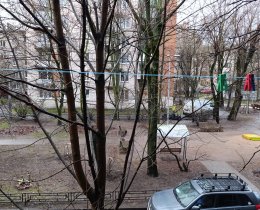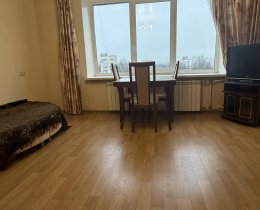Negotiating the Petersburg Property Maze
Foreigners in St. Petersburg frustrated with the dual-pricing system will be happy to know that there are some transactions in which state law treats foreigners just like Russians - for example, in the purchase of real estate.
As Marina Sirenko of Nevsky Prostor real estate agency points out: "There are no special rules that apply just to foreigners. For a foreigner to buy an apartment, all he needs is a passport - with a notarized Russian translation."
If you are in the market for an apartment, however, there are certain necessary steps to follow - not to mention potential pitfalls to avoid. But in most cases, there's little to worry about if you do some research, hire professional help and rely on your common sense.
The process requires five essential steps: hiring an agent, searching for an apartment, signing and notarizing an agreement, making the payment for the apartment and registering your rights to the real estate.
One situation that may arise is a particularly Russian problem linked to the breakup of the Soviet Union and the subsequent privatization of property. Sirenko explains that when trying to purchase an apartment there are two basic cases. The first is that you will deal with a person who has purchased the apartment and thus has the right of ownership. The second scenario is that you'll be dealing with a person who doesn't have the right to ownership but only the right to live in the apartment, which he received from the state when the property was privatized.
"When purchasing an apartment from a person who has the right to live [in that apartment], he has to be re-registered elsewhere. It is, in fact, necessary to receive his agreement to sell something that doesn't really belong to him. In some cases it's not possible to receive this agreement. If that person cannot be registered anywhere else, the apartment becomes, in a sense, outside the law. The injured party may apply to a court, and the apartment can be placed 'under arrest,'" Sirenko said.
Maxim Kalinin, a lawyer at the St. Petersburg office of Baker & McKenzie, gives a relevant example that, though not extremely common, does occur. In many cases, the apartments that foreigners are buying today were communal apartments in the Soviet period. This means that an apartment that housed several families was privatized, renovated and sold as a single apartment. As in the case mentioned above, when the state privatized property, the persons living in any one place received the right to continue living there, though not the right to ownership. When applied to communal apartments, the resulting situation is that a number of individuals were all given the right to continue living in a single area, but no one person received the right to the entire property.
"What has happened," Kalinin explained, "is that some people who received this right to live [in a certain place] left the country when it became easier to travel after the Soviet period. While they were abroad someone sold their communal apartments into private ownership. Upon returning, however, they still had the right to live in their former place of residence. As a result, what has happened is that someone will come forward with a legitimate claim to live in a certain apartment that has been sold and now is under private ownership."
Sirenko added that such a situation is further complicated by the fact that the state does not guarantee the right to the ownership of real estate. "Almost every country in the world ensures the right to ownership of real estate, but such a guarantee is not provided in Russia. When you buy real estate [in other countries] you can be sure that you have the right to that property and that no one can make you leave. In Russia, such laws have not developed yet, and thus the state cannot provide such guarantees."
Fortunately, however, there are certain steps that one can take to avoid such a situation. The first step is to look for an apartment that has been recently privatized. The next measure is taking the time to check out the history of the apartment you plan to buy. If you know the property's cadastre number you can ask the City Property Fund for any available information regarding the apartment's current legal status and any past transactions. In such a case, it's possible to find out who is the official owner of the property, if one exists, or if the property has been mortgaged, or pledged in another transaction.
"This is not something you have to do yourself. Most agencies are experienced in checking property histories, and if they're good they'll do it for you. I would recommend, however, not using the same agent as the seller. It may cost more, but it's worth it," Kalinin explained. Using different agents will avoid any conflicts of interest that may arise, or collusion on the part of the seller and the agent.
In avoiding these problems the solution really lies in the agent you choose. But how do you know that the person or agency you choose has the experience necessary? And perhaps most important of all, how do know that you can trust the agent you hire?
As one foreign businessman, who has now bought two apartments in the city, explained: "The first time I bought an apartment my biggest fear was of being cheated. That was probably what contributed most to my decision to go with a foreign-owned real estate agency."
The businessman, who asked not to be named, eventually bought another apartment, this time using a Russian agent recommended by a friend.
"The main difference," he said, "was that the first [foreign] agent was more communicative. He called every time he found a new place to look at or whenever he needed some more information. I often didn't hear from the Russian agent for weeks." He explained, however, that the main advantage of the Russian agent was, in fact, that he was a local and could recommend certain areas to live in and urge caution about others. Whatever your choice, however, you'll eventually have to determine where you want to live and how much you want to spend.
But location is not the only factor taken into account when pricing an apartment. Further factors to look for are the quality of the renovations and the presence of creature comforts such as independent heating, water filters and building security. Depending on the particular combination of factors present, an apartment can cost anywhere from $300 to $4,000 per square meter.
Once you have agreed on an apartment, you'll need to do some paperwork - which may turn out to be the simplest part of the process. Once again, any professional agent will be able to do most of this for you. They'll provide the purchase-and-sale agreement and arrange for you to meet with the seller at the office of a notary, in whose presence both the buyer and seller have to sign the agreement for it to be official.
Baker & McKenzie's Kalinin said that any notary will be able to answer questions concerning documentation. Once all of the appropriate documentation has been signed then it must all be delivered to the City Bureau for the Registration of the Rights to Real Estate.
"Your rights only begin upon registration," Kalinin added. Thus, simply signing and notarizing the agreement for the purchase and sale of the apartment does not make you the owner. Additionally, there is a fee for the registration of any real estate transaction, but it is "quite small" according to Ka linin and varies according to the value of the transaction and how quickly you want to carry out the registration.
Everyone interviewed for this article pointed out that the agreement will almost never contain the real transaction value. The seller simply isn't willing to pay the full amount of taxes and thus officially registers the transaction with a lower value. They also pointed out that, though it is illegal to conduct transactions in a foreign currency, almost all transactions are actually carried out in dollars.
If you need to wire money into the country it will be necessary to open an account with a local bank, which requires nothing more than your passport. Kalinin, however, warns that you shouldn't pay all of the money for the transaction up front. An agreement should be worked out in which a small down-payment is made and the remainder of the money is transferred after the registration is approved, since only then will you actually have the legal right to ownership of the apartment.














